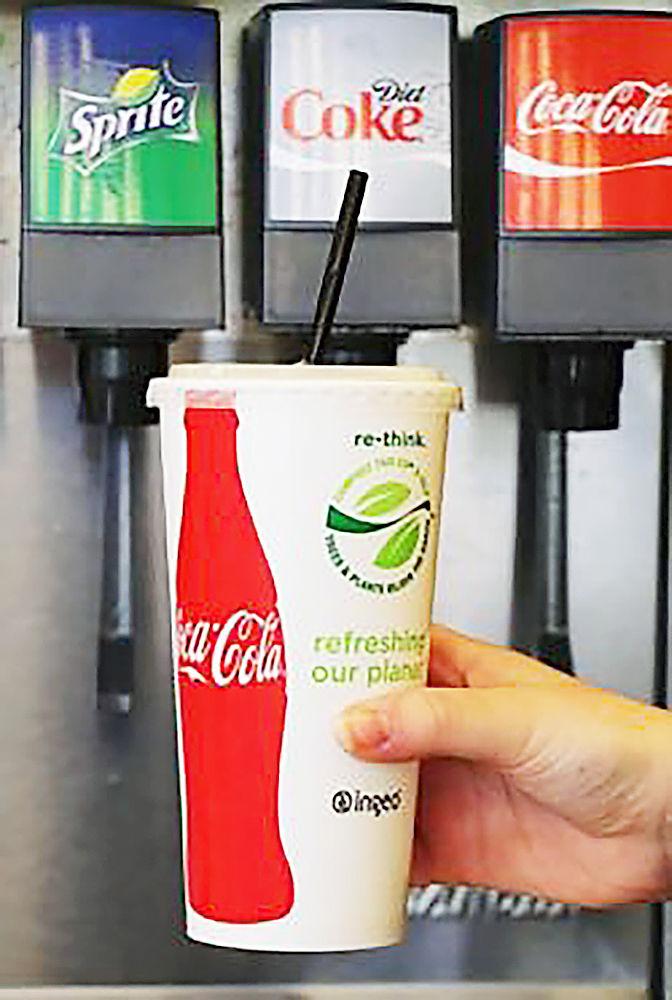
Contributed by Lindsay Pennell Hester
Introduced Jan. 8 by Campus Enterprises and NC State's Sustainability and Recycling Offices, the compostable cups join many other eco-friendly products in Talley Student Union.
NC State is continuing its eco-friendly campaign with the implementation of compostable cups at Talley Student Union and Centennial Campus’ On the Oval.
Beginning Jan. 8, NC State began broadcasting the newly compostable cups through social media and advertisements around campus.
Campus Enterprises, partnering with the university’s Sustainability and Recycling Offices, recently expanded their offerings of compostable products to include drinking cups. This addition joins the compostable napkins, to-go containers and single-use bamboo plates that are offered at the One Earth World Cuisine in Talley.
According to Hannah Erwin, manager at On the Oval Culinary Creations, NC State Dining is glad to help the university go green.
“NC State Dining is proud to be a contributing partner to the university’s overall sustainability goal,” Erwin said. “Implementing compostable cups, lids and straws at On the Oval and Talley dining locations is an essential step in reducing landfill waste on campus. The students that have noticed the change are happy about it, even noting they are proud to be a part of a more sustainable Wolfpack family.”
Lani St. Hill, Waste Reduction and Recycling Outreach Coordinator for NC State Recycling, elaborated on just how much waste is produced on campus and how the compostable cups reduce it.
“When you forget to bring your own cup, having a compostable cup is the next best thing,” St. Hill said. “Our campus throws away an estimated 585,773 pounds of drink containers each year- By bringing your own cup, or by using a compostable cup which you then put in the compost bin, we can reduce our waste-to-landfill, reduce methane gas emissions, and generate a nutrient-rich soil amendment to use back on campus.”
Students have applauded NC State’s dedication to sustainability and furthering sustainable products around campus.
Kalle Simpson, a first-year studying environmental science, said she is happy about the change. She participates in the North Carolina Public Interest Research Group, a student organization aimed at finding solutions for world issues, such as pollution.
“I love the newly implemented compostable cups in Talley, and I think NC State is headed in the right direction” Simpson said. “I care for the environment and now am happy that I do not have to think twice about where my cup is being disposed.”
Some students added that the compostable cups should be expanded to the Atrium Food Court and other NC State dining locations around campus. Tess Kelly, a first-year in exploratory studies, is one student who is looking for more comprehensive changes to be made.
“It would be a good idea to expand the compostable cups to minimize our landfill waste,” Kelly said. “Hopefully all cups at NC State will one day be compostable.”
By implementing the compostable cups and more, Talley Student Union is estimated to decrease 15 percent of the waste created. In the future, NC State Student Centers is aiming for a 60 percent waste decrease from Talley by the year 2020.
“NC State views waste as a resource, and once composted, these cups will have a second life as a nutrient-rich soil amendment,” said Adam Bensley, NC State’s waste diversion coordinator. “Using compost in the landscape helps build a healthy soil and reduces the need for irrigation, as well as synthetic fertilizer and chemical treatments.”
Maddy Caruso, a first-year studying life sciences, added that the next step for reducing campus-wide waste would be getting rid of plastics as a whole.
“I applaud Port City Java for having the incentive of bringing your own reusable cup, and getting fifteen cents off of your purchase,” Caruso said. “I think expanding that to all food and drink locations would definitely get students to not use as many plastic cups, helping reduce waste throughout campus.”
St. Hill encourages students to do their part in helping the campus reduce its waste.
“Remember to check the label,” St. Hill said. “Only [put] compost cups, lids, and straws that state ‘Compostable’ and/or ‘BPI Certified’ in the compost bins on campus.”